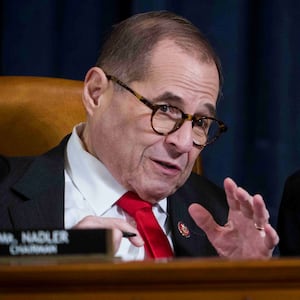Speaker Nancy Pelosi and House Democrats formally announced their articles of impeachment against President Trump on Tuesday morning. Flanked by the committee chairs who led the inquiry, Pelosi said the House would move to impeach Trump on two counts: abuse of power and obstruction of Congress.
“Today, in service to our duty to the Constitution and to our country, the House Committee on the Judiciary is introducing two articles of impeachment, charging the president of the U.S., Donald J. Trump, with committing high crimes and misdemeanors,” said House Judiciary Chairman Jerry Nadler (D-NY).
The introduction of articles effectively concludes the impeachment inquiry that began in September to investigate the extent of Trump’s pressure campaign to get Ukraine to do him political favors. It sets the parameters for a full vote in the House on impeachment next week—and a trial in the Senate in January.
After their press conference on Tuesday morning, the Judiciary panel released the text of the articles of impeachment to the public, which lays out their case over nine pages.
“President Trump used the powers of the presidency in a manner that compromised the national security of the United States and undermined the integrity of the United States democratic process,” the articles read. He “thus warrants impeachment and trial, removal from office, and disqualification to hold and enjoy any office of honor, trust, or profit under the United States.”
After describing the White House’s stonewalling of Democrats’ request for documents and testimony, the articles posit that “this abuse of office served to cover up the president’s own repeated misconduct and to seize and control the power of impeachment.”
Abuse of power is the first article of impeachment that appears, and it’s been the most talked about by Democrats. In recent hearings in the Judiciary Committee, they have laid out the case Trump abused the authority of his office by leveraging his power to compel Ukrainian President Volodymyr Zelensky to announce investigations into the Biden family and theories about Ukrainian election interference to help Hillary Clinton. Democrats argue that because Trump’s conduct involves the election and a foreign power it is a textbook example of what the Founders imagined for impeachment.
House Intelligence Committee Chairman Adam Schiff (D-CA) addressed that argument during his brief remarks Tuesday.
“Now, some would argue, why don’t you just wait? Why don’t you just wait until you get these witnesses the White House refuses to produce? Why don’t you just wait until you get the documents the White House refuses to turn over,” Schiff said, before noting it took eight months to get a ruling to show White House counsel Don McGahn did not have the “absolute right to defy Congress.”
Schiff said that argument amounted to saying, “Why don’t you just let him cheat in one more election?”
“The president’s misconduct goes to the heart of whether we can conduct a free and fair election in 2020,” he said. “It is bad enough for a candidate to invite foreign interference in our political process, but it is far more corrosive for a president to do so and to abuse his power to make it so.”
Trump responded in a tweet: “Nadler just said that I ‘pressured Ukraine to interfere in our 2020 Election.’ Ridiculous, and he knows that is not true. Both the President & Foreign Minister of Ukraine said, many times, that there ‘WAS NO PRESSURE.’ Nadler and the Dems know this, but refuse to acknowledge!”
Throughout the process, Democrats had argued Trump was effectively impeaching himself by obstructing Congress’ investigatory process. In the Ukraine matter, the White House ignored Democrats’ subpoenas for documents and testimony, preventing them from filling in key gaps in the investigation.
Key figures from former Energy Secretary Rick Perry to Acting Chief of Staff Mick Mulvaney were blocked from testifying, while the State Department sat on thousands of pages of documents—which they were once planning to hand over—that could have fleshed out the events described by the witnesses who did testify.
The article on obstruction of Congress, then, was hardly a surprise. The most revealing bit of news from the articles’ rollout was their omission of Special Counsel Robert Mueller’s Russia investigation and its findings that Trump probably obstructed justice.
The only allusion to Mueller was a statement that Trump’s actions on Ukraine were “consistent with President Trump’s previous invitations of foreign interference in United States elections.”
All week, Democrats’ hints to a “pattern” of behavior exhibited by the president seemed to indicate that the findings in Mueller’s report had at minimum informed what is ultimately voted on in the House Judiciary Committee later this week.







